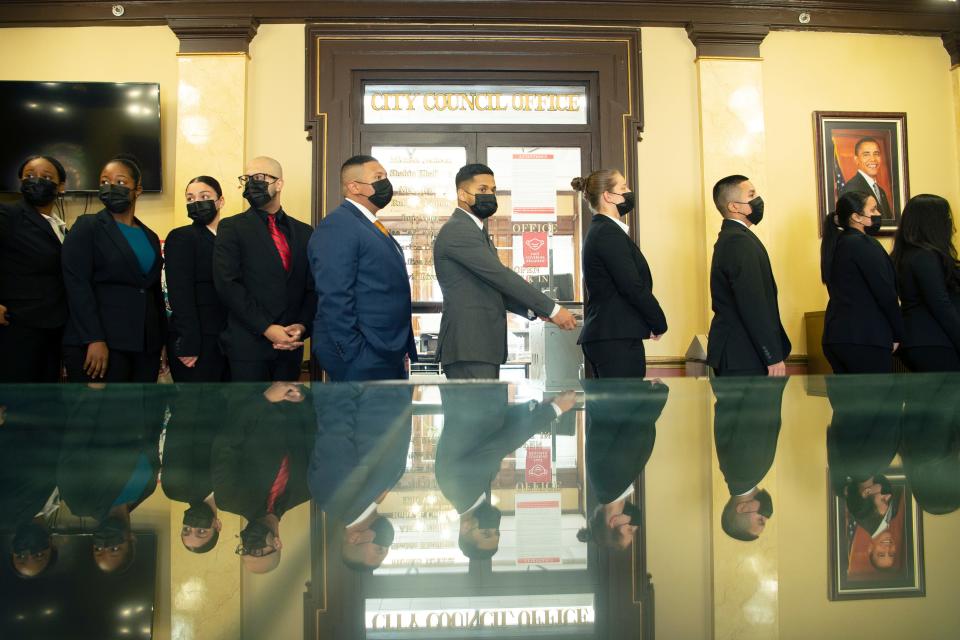NJ police licensure law adds accountability for law enforcement, chiefs say | Opinion
The time has finally come for New Jersey police officers to become licensed in similar fashion to other professions.
When Gov. Phil Murphy signed the law, S2742/A4194, on July 21 requiring licensure through the state’s Police Training Commission, it further assured the Garden State can continue to lead the nation in progressive police policies designed to enhance agency and officer accountability.
For many years, New Jersey was one of a small number of states that did not have a uniform body of standards to support the professional development of each law enforcement officer. Our state has now taken the natural next step to establish the important official licensure, the 47th state to establish such a program.
The New Jersey State Association of Chiefs of Police — one of the state’s premiere law enforcement organizations since 1912 — provides our membership ongoing opportunities to apply “best practices” in leadership, management and operational practices. The goal: enhance community engagement, trust and confidence. We believe licensure is another step toward meeting that goal.
The PTC, which establishes statewide law enforcement standards, voted unanimously in June 2020 to create this program, recognizing that more than 40 states use a form of decertification or licensing for law enforcement officers. This new law now grants the PTC the responsibility to monitor and potentially revoke the licenses of any officer who does not comply with established professional standards.

I believe this police licensure program applies fairly to small and large agencies, alike, with clear and unambiguous standards, a due process component that applies practical measures to encumber licenses, as appropriate, and offers transparency in public notice.
Moreover, by establishing professional standards, there can be a more consistent application of discipline. Unlike with doctors, lawyers, electricians or other regulated professions, the state had not previously had the ability to track prior disciplinary action against law enforcement. Because police disciplinary measures are often handled locally, behind closed doors at individual police departments, a poorly-performing officer could ultimately find a job somewhere else in the country with what appears to be clean slate.
Not anymore, in New Jersey.
It is important to note there is still no national governing body that monitors and enforces continuing education requirements or certification standards for police officers. Our constituents may also be surprised to learn there are no national standards for training or certification or no national database to track officers’ transgressions.
Despite the fact that police anywhere in the U.S. can carry weapons and have broad authority to make arrests, there has never been a cohesive regulatory approach, despite spotty calls for mandatory licensure nationally.
Consequently, most states have Peace Officer Standards and Training boards or similar agencies, with a range of authority and duties. Under this new law in New Jersey, bad police officers can be decertified at the state level, rather than relying on professional misconduct to be handled locally.
NJSACOP is pleased that this new law will help to move law enforcement in New Jersey to the highest level of professionalism through licensure. We are now calling for set standards and a due process component that is fair, equitable and transparent to the public.
NJSACOP also advocates for ongoing state audits for these licenses, thus ensuring that corners are not cut in any New Jersey police department.
I’m pleased that every “licensed” police officer in New Jersey must answer to a universal code of conduct, related to such areas as excessive force, criminal convictions or dishonestly in the performance of duty. If this code were not followed, the state finally has a licensing authority that can discipline, suspend or terminate the officer, with the information shared nationally.
This licensure law — with a real and transformative impact — will create better officers, better police departments and greater transparency in further underscoring the commitment to protect and serve.
Thomas Dellane is president of the New Jersey State Association of Chiefs of Police.
This article originally appeared on NorthJersey.com: NJ police license law adds accountability, police chiefs say

